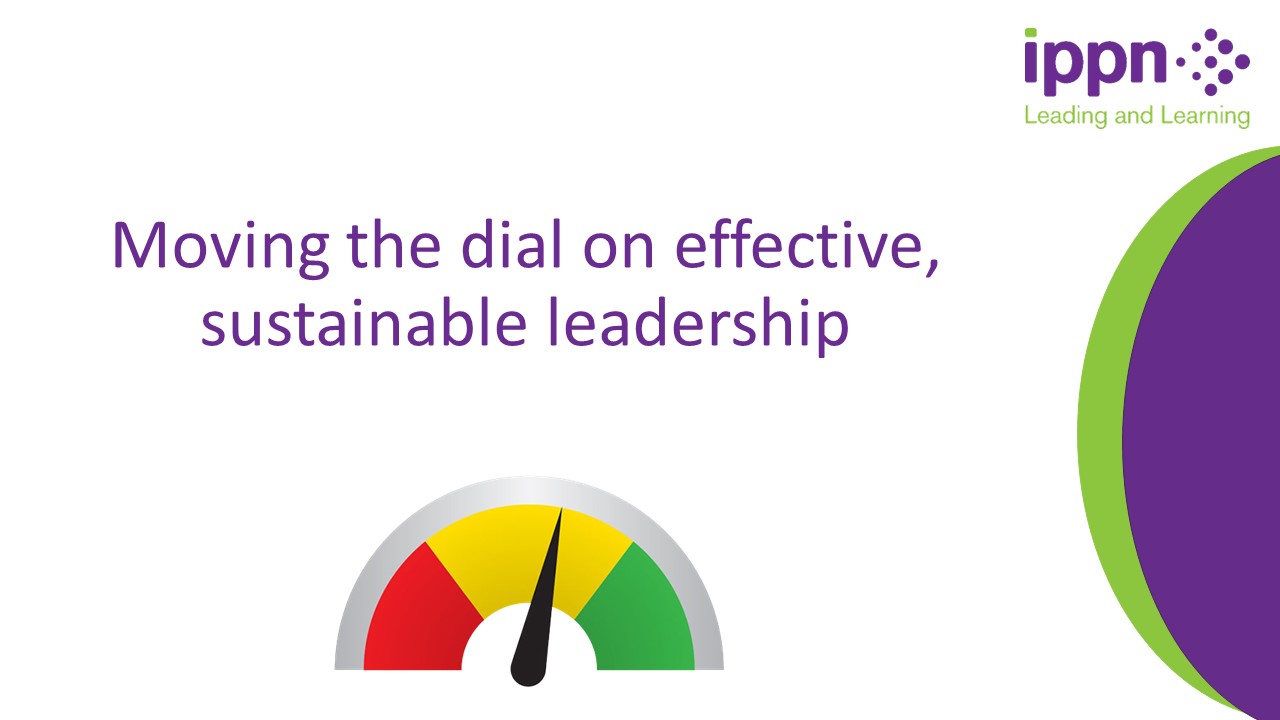Sustainable Leadership
Moving the Dial on Leadership – a twin-track approach
 The primary focus of IPPN’s work is the empowerment of effective school leadership, whether that is through the supports and services we offer or the advocacy work we undertake. We do so because we know that leadership matters.
The primary focus of IPPN’s work is the empowerment of effective school leadership, whether that is through the supports and services we offer or the advocacy work we undertake. We do so because we know that leadership matters.
Of course, as the professional body for primary school leaders, you would expect us to be banging the drum about the importance of leadership. But it’s not just us saying it. In the Global Education Monitoring report that it released in October, UNESCO clearly identifies that an inordinate focus on administrative and bureaucratic tasks is limiting capacity to focus on teaching and learning which is impacting negatively on student outcomes.
So, what conditions must be met for school leadership to be both effective and sustainable. Well, it is IPPN’s view that
- there needs to be greater clarity around the role and focus of school leadership
- the necessary structures and resources must be in place to facilitate and support the practice of leadership
- leaders must be able to focus on their core purpose of leading teaching and learning
- meaningful capacity must exist to share leadership and
- the practice of leadership must not have a negative impact on the health and wellbeing of school leaders.
These are the elements that need to be in place for leadership to be both effective and sustainable.
This time last year, IPPN and NAPD convened a symposium on education and leadership. The symposium sought to cast a fresh light on the critical challenges faced by school leaders and their efforts to ensure a balanced practice of leadership and management in schools.
In its response to the issues raised at the symposium, the DE acknowledged that it accepted the data and analysis with regard to the unsustainability of school leadership roles and that the focus now needed to move to actions and solutions.
To that end, IPPN proposed specific actions to address the need for:
- a greater allocation to schools of discrete time for leadership
- school leaders to maintain their focus on their core purpose of leading teaching and learning
- greater capacity to share leadership effectively and
- enhanced governance practice, both current and future.
Since the failure of last year’s budget to target meaningful action to support school leadership, we have met with DE officials, with the management bodies, with the INTO and with relevant agencies such as NCSE and NCCA. Those meetings have been constructive and we are encouraged by the coalition of support that is forming for our proposals. Our ongoing advocacy will focus on ensuring that the value and importance of school leadership is recognised and supported by substantive measures. Progress is being made in this regard.
But, as stated earlier, IPPN also seeks to empower effective leadership through the provision of supports and services. Rather than just talking about the importance of maintaining a focus on your core purpose and on the school’s stated priorities, we need to give you access to tools and resources that will assist you to do just that.
It is in that context that we developed
- a leadership effectiveness reflection tool
- a guide to the leadership of teaching and learning and
- a resource bundle for the P-I-E-W framework.
The Leadership Effectiveness Reflection Tool was developed to
- facilitate reflection on leadership practice within the school
- ensure greater clarity around the role and responsibilities of school leaders
- ensure a more balanced practice of the leadership and management dimensions to the role and
- promote a greater sharing or distribution of leadership.
It is based on the domains and standards of the Quality Framework for leadership and management and details the tasks/actions associated with the achievement of those standards, with a view to establishing who is best placed to undertake such actions.
The guide to the leadership of teaching and learning does exactly what it says on the tin. It seeks to identify the different elements involved in leading teaching and learning, and the leadership considerations that emerge. It is important to remember that this is a shared responsibility and not one to be shouldered only by the senior leadership team.
The PIEW framework was developed to
- empower schools to maintain a focus on their stated priorities
- manage school improvement planning, whether that is through the SSE or DEIS planning processes and
- control and manage the flow of initiatives into the school.
As well as developing this into a resource bundle, the Making Your Leadership Role more Doable workshops, being convened in every county, give practical tips and guidance on how to use the framework in your school. The feedback from the sessions in January has been really positive in relation to not only the framework, but also the reflection tool and the guide.
IPPN will continue to advocate on your behalf and to provide you with supports to enhance your leadership capacity, your leadership effectiveness and the sustainability of your leadership role.










